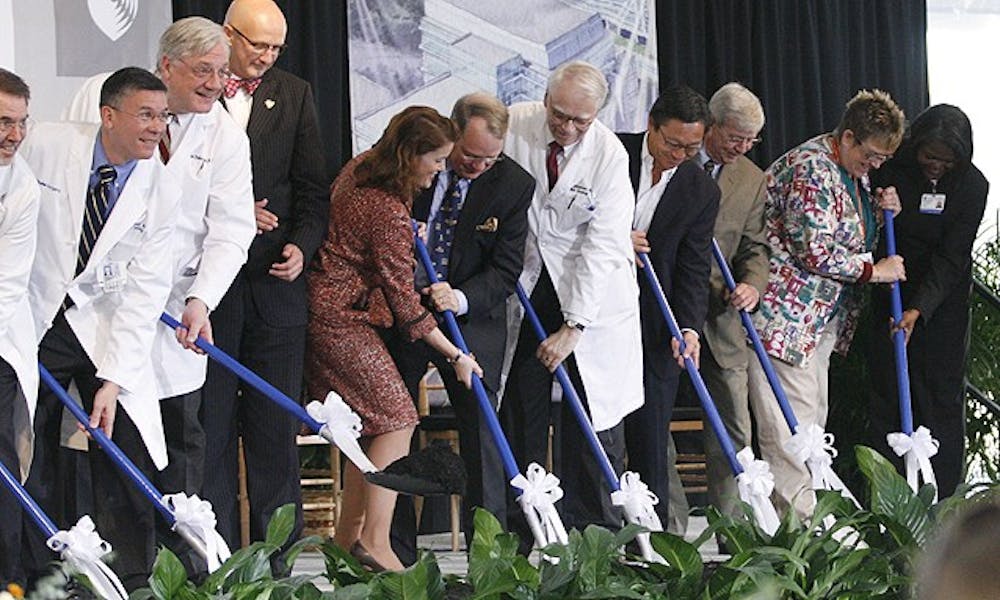Valarie Worthy won her battle with breast cancer 10 years ago, but there are certain things she says she will never forget.
She remembers a Duke University Health System employee bringing her from the White Zone to the Red Zone and back for various procedures—all in a day’s care. She recalls receiving her treatment in a recliner because there were not enough beds.
And she can still picture the face of the X-ray technician who let her sing a song to drown out her fears.
“I was out of tune, out of beat, but he acted as if that was the best song he had ever heard,” Worthy said. “But isn’t that the kind of care we give here at Duke?”
Today, Worthy is an oncology nurse at Duke. The care that Duke nurses, technicians and physicians provide their patients is unchanged, she said. But in 2012, if all goes according to plan, the facilities in which patients receive their treatment will be quite different.
DUHS officials, Gov. Bev Perdue, President Richard Brodhead and dozens of community members gathered Friday afternoon to break ground on a new cancer center, a seven-story, 267,000-square-foot, $235-million expansion that will bring clinical services, currently scattered across the medical campus and outpatient clinics, under one roof. A cake on display modeled the building.
“We’re here to break ground for this center because it is a spectacular facility—you can see that in the cake, though I think it is a bit tilted,” said Dr. Victor Dzau, chancellor for health affairs and president and chief executive officer of DUHS in his speech at the event. “This is a historic moment for Duke Medicine.... Cure is an ambitious word, but we are not afraid of it because curing cancer is what we intend to do.”
The idea for the new cancer center was conceived in 2005 when DUHS was crafting its strategic plan, and the planning began in earnest two years ago, said DUHS Associate Vice President Carolyn Carpenter. She noted that DUHS officials had serious conversations about the funding and timetable for the project when the stock market crashed last fall, but she emphasized that the project itself was never at risk.
“In light of these hard economic times, I’ve said, ‘Should we go forward?’” Dzau said. “And [DUHS employees] have said, ‘We have to invest in the future.’”
The new cancer center is part of DUHS’s $700-million expansion. To fund the projects, DUHS will borrow a total of $300 million and launch a $200-million fund-raising campaign, Dzau said. Several donors have already expressed interest in contributing, he added.
The rest of the funding for the project will come from operations, and Dzau said he has been trimming DUHS’s budget—cutting $50 million this year and planning for an additional $25 million in savings next year—to ensure that the revenue can be generated. Although health care reform may change how hospitals are reimbursed for care, Dzau said he does not think the changes will be significant enough to threaten funding for the expansion. If there are insufficient funds, DUHS will dip into its reserves to finance the projects, he added.
“If we continue to perform like we have the last few years, we will be fine,” he said in an interview. “I will never put the institution at financial risk.”
Cancer cases are predicted to rise 14 percent nationally and 20 percent in the Triangle area between 2006 and 2011, meaning that the new cancer center cannot come soon enough, DUHS officials said. The University of North Carolina at Chapel Hill opened the N.C. Cancer Hospital, a 315,000-square-foot facility, in September.
“I have gotten to the age when I don’t ask if I’ll be diagnosed, but when, because cancer is so prevalent among us,” Perdue said.
Linked to the Morris Cancer Clinic, the new center will expand Duke’s oncology offerings with 140 examination rooms, 75 infusion stations, a pharmacy and lots of greenery—chemotherapy patients will be able to receive their treatments on a garden terrace. Construction is expected to end in 2012.
Jeffrey Crawford, chief of medical oncology, said he thinks DUHS’s investment in cancer care in this time of economic uncertainty means a great deal to his patients.
“For our patients, they may never be treated in this new building, but it gives them hope,” he said in an interview. “Despite the economy, despite the fact that Duke is going to have to finance a lot of this on their own, we’re hoping that with that commitment others will step up.”
The speeches were given in a large white tent erected where the new cancer center will eventually stand. Although crews will not lay the foundation of the building until January, Worthy said DUHS has been ready for the expansion in other ways for years.
“I’m excited because we have already laid the groundwork,” she said. “We have state-of-the-art care. We have compassion.”
Get The Chronicle straight to your inbox
Signup for our weekly newsletter. Cancel at any time.

